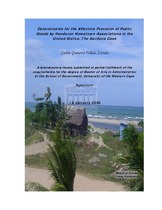Determinants for the effective provision of public goods by honduran hometown associations in the United States: the Garífuna case
Abstract
The study concludes that the existence of HTAs in the USA is explained by the socially enforced institution of the hijos del pueblo (sons of the town) having a duty to help their hometowns, as well as the private benefits of preserving Garífuna traditions and the possibility of helping repatriate dead immigrants. Fulfilling this duty (and the consequent prestige attained) provides the incentives to send CRs home. In the cases studied, CRs were used to partly finance potable water projects, electricity projects, road paving, a community centre and the construction of a Catholic temple. In most of the cases HTAs worked with a local development organisation, known as Patronato, which formed specific committees for executing projects, for example the water and the electricity committees. For the construction of the temple, a religious organisation known as Pastoral was the local partner. The term Collective Remittances (CRs) refers to the money sent by migrant associations, known as Hometown Associations (HTAs), to Community-Based Organisations (CBOs) in their hometowns for financing public works projects. Few cases of CR are known in Honduras. The only ones reported are among the Garífunaethnic group living on the Caribbean Coast, and with a large migrant community in New York City (NYC). This mini-master’s thesis is the first study written on CRs in Honduras. It studies CR experiences in four Garífuna hometowns and their corresponding HTAs in NYC. It answers three questions: How do CRs work in each case? What are the determinants for HTAs to provide CRs to the hometowns? And what are the determinants for local CBOs in the hometowns to use the CRs effectively to provide public goods in the hometowns? CR is conceptualised as a that chooses which local group and project to finance, and the local CBO, which is the agent

